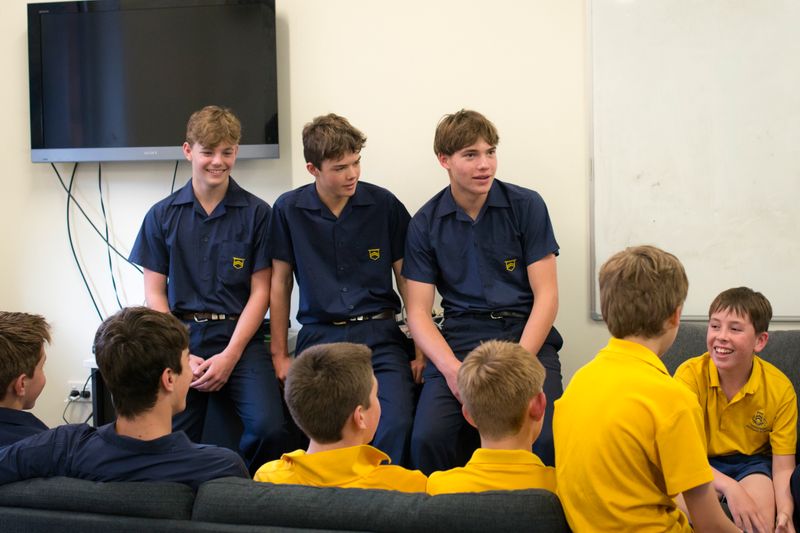“In doing so, the Year 10 boys act as coaches to guide the boys through these problems, providing advice from personal experience via the embedded leadership curriculum. The intention of this curriculum is to provide a shared language for emotional expression, thus providing Year 7 boarders with the vocabulary to express themselves and to model vulnerability and reciprocal patterns of self-disclosure.”Mr Henry White, Head of Corfe House

A residency designed to foster a positive sense of belonging.
As a boarding master of adolescent boys, my role fundamentally concerns pastoral wellbeing and character development to support a successful academic journey. A positive sense of belonging — where boarders feel safe, supported and heard — is fundamental to an effective boarding environment. As such, I felt there was a distinct connection between the International Boys’ Schools Coalition’s (IBSC) theme for the 2024–25 Action Research Cohort, “Boys and Belonging” and what I believe is best practice boarding in Corfe House.
Through 10 years of experience in boys’ boarding houses, I’ve observed a reluctance among boys to voice their concerns and express themselves emotionally, thus allowing themselves to be vulnerable amongst their peers and immediate support network. This reluctance significantly impacts their ability and willingness to disclose problems and seek help. Consequently, it affects their sense of belonging within the boarding environment and has broader implications for their holistic development. This issue is particularly pertinent for boarders in Corfe House, who are in the early stages of identity development.

I’ve noticed that even boys with emotional maturity or the tools to communicate their concerns are not necessarily inclined to do so. This observation has led me to consider the connection between a boarder’s sense of trust and their willingness to display vulnerability, likely influenced by cultural norms related to masculine identity rather than just their ability to articulate themselves. I believe that fostering a heightened sense of belonging within a boarding environment may effectively counter these cultural norms.
When considering this context amongst the larger body of research literature, it is frightening to consider the bigger picture at play — that being the damning statistics surrounding Australian men and issues pertaining to men’s mental health and suicide. I’d like to think these concerning trends can be countered by positive cultural shifts that promote male vulnerability and allow men to speak out and seek support without fear of shame or being perceived as weak.
As such, the purpose of my research project is to provide my Corfe House boarders, who embark upon their broader boarding journey at a relatively impressionable age, with the necessary skillset, confidence and vernacular to effectively communicate issues presenting as barriers to their pastoral wellbeing and sense of belonging. In doing so, they are encouraged and empowered to be vulnerable rather than repressing their feelings — a common trait we see with adolescent boys, often influenced by cultural factors and a lack of words to articulate their emotions.

To enable this project, we initiated the official Corfe House Year 10 Service and Leadership Residency Program at the commencement of Term 2 in 2024 — a residency for Year 10 boarders with aspirations for leadership and a willingness to serve. So far, we’ve been incredibly impressed by the newfound sense of calm within Corfe House and the positive mentoring that has developed organically. Within this residency, we have embedded a Leadership and Character Education Program for Year 10 residents comprising explicit teaching in leadership, coaching, peer support and lessons in positive masculinity. Through this program and weekly mentoring and coaching sessions where the Year 10 residents embed these skills and knowledge within their own “Mentor Session”, we have sought to educate and broaden student perspectives that align with the TGS purpose — “Educating boys and developing their good character for life.”
During the mentoring sessions, the Year 10s share previous challenging experiences from their own time in Year 7 Corfe House boarding (thus modelling vulnerability), allowing an informal platform for Year 7 boys to reciprocate and share any current challenges they are facing.
Furthermore, as a means of measuring Corfe House boarders’ increased willingness to be vulnerable, Year 6 and 7 Corfe House boarders undertake a daily wellbeing survey each evening designed to gauge boarders’ daily emotional wellbeing and their willingness to disclose their problems, thus providing a platform to demonstrate their vulnerability.
While a boarding leadership residency is not a revolutionary concept, the embedded Leadership and Character Education Program and new methods to measure boarder pastoral wellbeing offer a valuable point of difference for our School. In addition, Year 10 residents become participants in the wellbeing and pastoral care of younger boarders — a novel experience that fosters personal relationships and good character development — rather than simply being a presence. Moreover, by empowering Year 10 residents with leadership capabilities and opportunities to exercise these skills, they also develop their own leadership identity and sense of belonging through ownership within the larger boarding program.
Latest Blog
Outdoor Pursuits and Activities Week - Developing Good Character Beyond the Classroom
We offer a range of enrichment activities for our boys, but the last week of Term 1 is a very special opportunity for all of our Senior School students. It's Outdoor Pursuits and Activities Week, which provides age-appropriate physical challenges in a safe, well-supervised environment. Activities on the various camps may include ropes courses, rock climbing, bodyboarding, surfing, mountain biking and canoeing. The aim is to foster a love of the outdoors and an appreciation of the environment.…
Stories behind key TGS staff helping shape our students
It was my great privilege to join TGS as Head of House - Boyce Boarding in 2024. The opportunity to lead these young men of character on their TGS journey carries great weight but is also enormously exciting. Embarking upon this project alongside my wife Meg as Boyce Boarding House Manager strengthens the team further. I am hopeful that we will demonstrate to the boys how positive relationships can foster a warm and supportive environment. I know that many of our boys are familiar with strong…
More Than Just an Education and That Makes All the Difference
Toowoomba Grammar School excels in its extensive co-curricular programs, particularly in performing arts and sports. Our boys learn that success comes from hard work and dedication. This ethos is inspired by quotes like “You don’t have to be great to start, but you have to start to be great,” “The harder I work, the luckier I get” and the words emblazoned on our P.B. Hauser Aquatic Centre wall “Success is the celebration of preparation.” These opportunities allow students to excel in programs…
Stewardship: Leading the Way in Safety, Sustainability and Security
However, the challenges facing the Director of Facilities, Mr Bengie Dickeson and the Director of Information Technology, Mr Ron Robinson certainly are. This month's weather has been nothing if not unpredictable and it's in those conditions that both these men's skills come to the fore. With Tropical Cyclone Alfred and its threat to our School campus and community - Mr Bengie Dickeson and Mr Ron Robinson played integral roles in keeping everyone and everything on our 150-year-old campus safe.…
Pursuing New Horizons in Horticulture
Jake Moon is a sixth-generation primary producer. He is dedicated to agriculture and is currently working at his family’s St George farming enterprise, tackling some of the sector’s biggest challenges. The 28-year-old says his family moved to the St George irrigation precinct in 1978, initially growing rockmelons and watermelons, hence the business name Moonrocks. Seasonal and market changes led them to switch crops frequently, growing grapes, broccoli and even wax flowers over the years.…
Crushing it at Cricket and Conveying Culture
He explains that he’s named after Yarramundi, a respected and influential leader of the Richmond tribes of the Dharagnora (Hawkesbury-Nepean region of New South Wales) and a respected elder of the Boorooberongal clan of the Dharug people. “I’m proud of my culture and excited to have just started learning Dharug Dalang as part of the language revitalisation with my family.” During one week late last year he juggled exams, balanced representative cricket in Mackay with being the emcee of the…
Disappointment: A Necessary Part of School Life
Schools are inherently hopeful and happy places. Their natural focus on growth, connectedness and preparing youth for a better future creates an optimistic atmosphere in which ambitions are born. These positive emotions and experiences lay the foundation for our expectations and while these can be highly motivating, they come with a catch: the greater our expectations, the greater the disappointments, too. Disappointment is not a popular feeling. Rightly so, not many of us wish to feel sad,…
Boys and Belonging at TGS
As a boarding master of adolescent boys, my role fundamentally concerns pastoral wellbeing and character development to support a successful academic journey. A positive sense of belonging — where boarders feel safe, supported and heard — is fundamental to an effective boarding environment. As such, I felt there was a distinct connection between the International Boys’ Schools Coalition’s (IBSC) theme for the 2024–25 Action Research Cohort, “Boys and Belonging” and what I believe is best…
Fostering Growth and Resilience
This philosophy is vividly demonstrated through our Junior School MATES program, an initiative designed to equip boys from Prep to Year 6 with the skills they need to thrive both in and out of the classroom. Year 6 leader Hugo Seaby epitomises what the program is all about. As a leader in Stephens House, he explains its importance: “It’s about spending time with the younger boys and learning about honesty, respect, kindness and other attributes like that.” He said that it’s helpful for the…